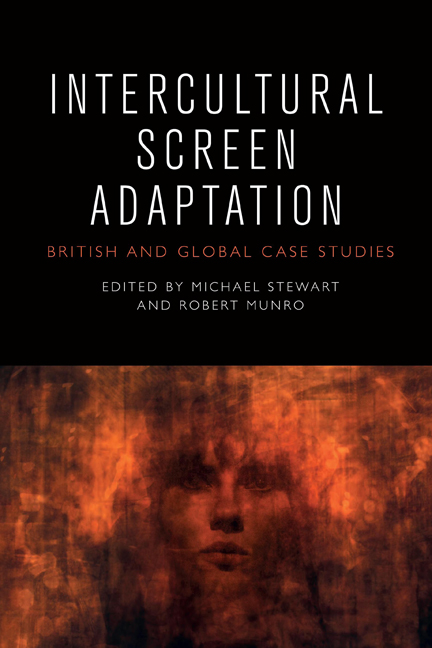Book contents
- Frontmatter
- Contents
- List of Illustrations
- Acknowledgements
- List of Contributors
- Introduction
- PART I NOSTALGIA, HERITAGE AND THE TOURIST GAZE
- 1 Adapting Pagnol and Provence
- 2 ‘A Tourist in Your Own Youth’: Spatialised Nostalgia in T2: Trainspotting
- 3 ‘200 Miles Outside London’: The Tourist Gaze of Far from the Madding Crowd
- PART II RADICAL CONTINGENCIES: NEGLECTED FIGURES AND TEXTS
- 4 Reframing Performance: The British New Wave on Stage and Screen
- 5 Why We Do Not Adapt Jean Rhys
- PART III RE-ENVISIONING THE NATIONAL IMAGINARY
- 6 ‘To see oursels as ithers see us’: Textual, Individual and National Other-selves in Under the Skin
- 7 Back to the Future: Recalcitrance and Fidelity in Julieta
- PART IV THE LOCAL, THE GLOBAL AND THE COSMOPOLITAN
- 8 El Patrón Del Mal: A National Adaptation and Narcos Precedent
- 9 Constructing Nationhood in a Transnational Context: BBC’s 2016 War and Peace
- 10 The Beautiful Lie: Radical Recalibration and Nationhood
- PART V REMAKING, TRANSLATING: DIALOGUES ACROSS BORDERS
- 11 In Another Time and Place: Translating Gothic Romance in The Handmaiden
- 12 Chains of Adaptation: From D’entre les morts to Vertigo, La Jetée and Twelve Monkeys
- 13 A ‘Double Take’ on the Nation(al) in the Dutch-Flemish Monolingual Film Remake
- Index
8 - El Patrón Del Mal: A National Adaptation and Narcos Precedent
Published online by Cambridge University Press: 22 September 2020
- Frontmatter
- Contents
- List of Illustrations
- Acknowledgements
- List of Contributors
- Introduction
- PART I NOSTALGIA, HERITAGE AND THE TOURIST GAZE
- 1 Adapting Pagnol and Provence
- 2 ‘A Tourist in Your Own Youth’: Spatialised Nostalgia in T2: Trainspotting
- 3 ‘200 Miles Outside London’: The Tourist Gaze of Far from the Madding Crowd
- PART II RADICAL CONTINGENCIES: NEGLECTED FIGURES AND TEXTS
- 4 Reframing Performance: The British New Wave on Stage and Screen
- 5 Why We Do Not Adapt Jean Rhys
- PART III RE-ENVISIONING THE NATIONAL IMAGINARY
- 6 ‘To see oursels as ithers see us’: Textual, Individual and National Other-selves in Under the Skin
- 7 Back to the Future: Recalcitrance and Fidelity in Julieta
- PART IV THE LOCAL, THE GLOBAL AND THE COSMOPOLITAN
- 8 El Patrón Del Mal: A National Adaptation and Narcos Precedent
- 9 Constructing Nationhood in a Transnational Context: BBC’s 2016 War and Peace
- 10 The Beautiful Lie: Radical Recalibration and Nationhood
- PART V REMAKING, TRANSLATING: DIALOGUES ACROSS BORDERS
- 11 In Another Time and Place: Translating Gothic Romance in The Handmaiden
- 12 Chains of Adaptation: From D’entre les morts to Vertigo, La Jetée and Twelve Monkeys
- 13 A ‘Double Take’ on the Nation(al) in the Dutch-Flemish Monolingual Film Remake
- Index
Summary
INTRODUCTION
The research project Historias locales, visiones globales (Local Stories, Global Visions) financed by the University of Medellín (Colombia) in collaboration with two other Spanish universities, the Pontificia of Salamanca and the Carlos III of Madrid, commenced in 2017. The project's goal was the comparative study of two television series, Narcos and El Patrón del Mal (EPDM). The idea was to scrutinise both productions in order to elucidate their main similarities and differences, as well as whether or not their countries of origin had conditioned the way the respective stories were articulated. For that, nine hundred scenes were selected (out of a total of 4,154 between both) and analysed from different perspectives: script, staging, sound and the connection between the narrated events and the way they were actually presented.
I have decided on a slightly different and provocative approach here, given that my main objective was based on two separate understandings of adaptation: on the one hand, there is the adaptation of EPDM from Alonso Salazar‘s La Parábola de Pablo (2001), which has led to a compared analysis between the two series and the book. The series obviously had different audiences in mind – this was reflected on the perspectives they adopted and that conditioned their discourses, especially when measuring how true-to-life they were to the actual events, as well as the ‘degree of similarity between the characters and the events found in the film and the book’ (Sánchez Noriega 2000: 63). On the other hand, even though Narcos does not have a direct literary reference, it adapts Colombian reality and history in accordance perhaps with what audiences around the world expect. Thus, I aim to clarify this adaptation manoeuvre of extreme currency through the lens of postcolonial studies.
Starting with the latter objective, let me consider a few lines taken from an obscure, albeit intriguing, article written by Von der Walde (1998), in which she establishes a stimulating analogy between magical realism and postcoloniality: ‘Both discourses about otherness have had held positions of privilege in the academia of the so-called First World partly because they have been provided by the Other,’ The author is thinking of Spivak (1990), when she defends the ‘canonization of magical realism as a literary paradigm of Third World production’ (1998: 161).
- Type
- Chapter
- Information
- Intercultural Screen AdaptationBritish and Global Case Studies, pp. 141 - 154Publisher: Edinburgh University PressPrint publication year: 2020



